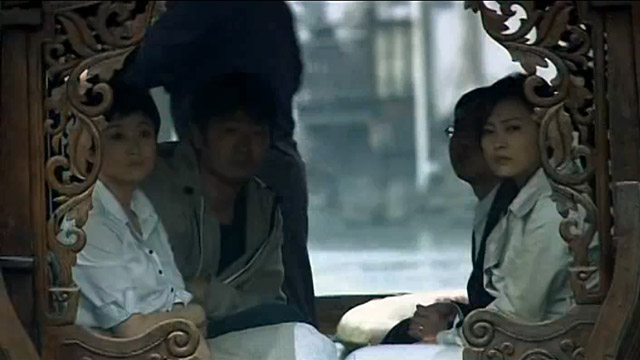Cry Me a River is a slow, contemplative film which demands a similarly contemplative review. Anything less will be unbefitting of the work of a man whom Film Comment recently pronounced “the greatest filmmaker of the aughts”, the leading luminary of contemporary Chinese film, and a man whose MoMA retrospective ended just this past week.
That man is of course Jia Zhangke, and I believe the preceding passage contains enough code words to ensure that you know the kind of art-house treatment you’re in store for with this, his latest short film. Cry Me a River is, in his words, an attempt to “see if I could tell a story that spanned 10 years in 15 or 20 minutes.” The story tracks a group of four college friends as they reconnect over a two-day reunion on the occasion of their college professor’s birthday. There exists unresolved tensions and feelings in the group dynamic that slowly work their way into the open throughout this subtle and observational film.
First a quick lecture. It is very easy to separate and track the great themes in contemporary Chinese cinema. After the opening up of the country in 1979, the celebrated “5th generation” of filmmakers—the first to be accepted into the newly reopened Beijing Film Academy—were eventually, inevitably, drawn to making sense of the profound upheavals the country had gone through: the establishment of the People’s Republic, the disastrous “Great Leap Forward”, and the “Cultural Revolution”. The result were poignant and brave epics, often banned in their home country, that nevertheless came to define a generation of Chinese film on the world stage: Chen Kaige’s Farewell My Concubine, Zhang Yimou’s To Live, Tian ZhuangZhuang’s The Blue Kite.
Zhangke has come to be acknowledged as part of a “6th generation”, a successor to these former standard-bearers. No longer looking backward to reclaim a people’s history, these filmmakers tend to be more preoccupied with the present and the growing alienation and disconnect inherent with the rapid economic growth and social change of contemporary China. The formative events of their lives center not on the Cultural Revolution, but instead the 1989 student protests at Tiananmen Square. It is the dissolution of this youthful fire and idealism that Cry Me a River, and indeed much of the 6th Generation’s work, implicitly mourns.
While the time frames involved are deliberately unclear, it is suggested that our group of four friends were students in the early 90’s. They wrote a single issue of a magazine called “This Generation”, the kind of strident, fully-felt manifesto that some, like the professor’s businessman sponsor, still feels today, even though he is no longer so “hot-blooded”. Unfortunately it seems our friends no longer are either. Random conversation establishes the monotony of their “grown-up” lives: making money, raising kids. The rebuke of their professor at the dinner in his honor is subtle, but unmistakable, “Mr. Chen, they were my students in the 90’s. Back then, they wrote a lot of poetry. But not anymore.”
These were the children of that rebellious and idealistic period, but now, 10 years later, they are accused of having lost their way. Zhangke encourages this parallel in an interview, pointing out that Cry Me River includes the lead couple of the movie Summer Palace, a 2006 film about Tiananmen Square, in order to subtly reinforce this connection for audiences. That film cost fellow 6th Generation director Lou Ye a 5 year filmmaking ban from the government, a sign that inconolastic art in China is not all dead.
While the this political subtext is available, the film is resolute in its focus on its characters. Slowly, through natural dialogue and patient minimalist camerawork that has drawn comparisons to Ozu and Hou Hsiao Hsien, certain relationships and disatisfactions become apparent. Ma’s self-mocking jokes about money reveal the financial class divide between him and Tang, while, early on, Zhou’s gentle touch of Ma hints at a former intimacy to be revealed later. Ditto for the iciness between Bao and Tang at around the 3 min mark.
The presence of others in the group keep the banter light and congenial despite the underlying turmoil. It is only the next day after the dinner that the tension is too much, as the couples share a wordless boat ride, introducing the river of the film’s title. The two couples split up at that time to say the words that 10 years had left unsaid.
Confucius compared time to a river, and ultimately it’s that sense of the elegaic that Cry Me a River hopes to capture. Characters getting older and becoming wistful over their youth and the missteps they may have made is by no means a novel concept in film, yet it is rare for short film. Zhangke’s goal was to tell a story of 10 years in 20 minutes, and despite an abrupt ending which lacks resolution, (what resolution could there be?) I dare say he succeeded. Cry Me a River is at once a sensitive and aware character study and poignant cultural statement.
(Note: The film is in two parts, follow the onscreen link after part 1, or click on the link underneath the “Play” button for part 2.)

 Jason Sondhi
Jason Sondhi